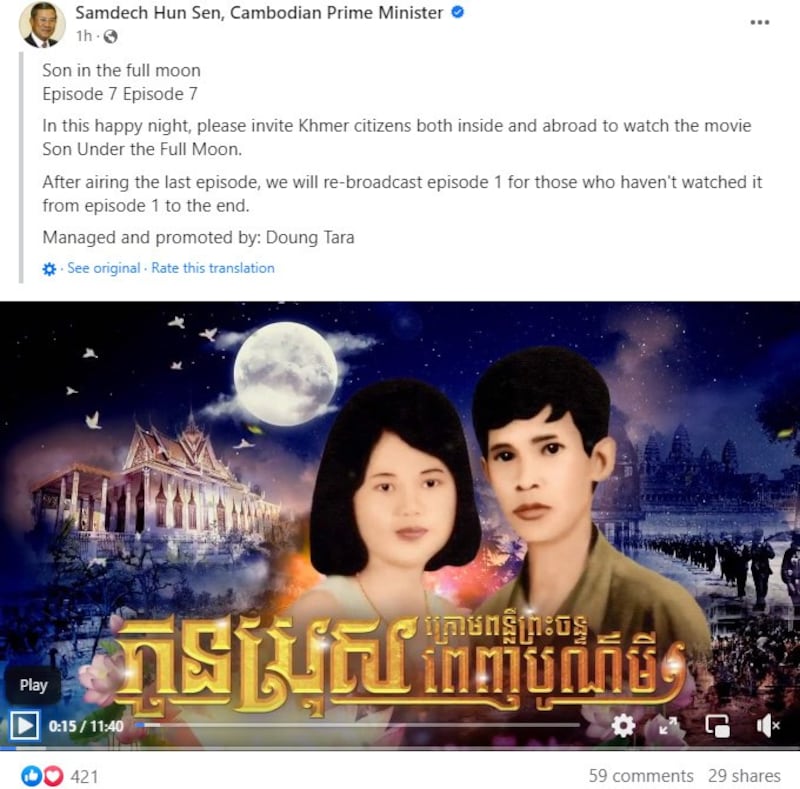Prime Minister Hun Sen has reappeared on Facebook, just three weeks after declaring that he was permanently leaving the popular social media site following a disciplinary finding from the company’s oversight board.
With the apparent help of an aide, Cambodia's leader began posting on a different page on Wednesday.
The page has many of the same photos and old posts from his official page and also includes newer messages about campaigning ahead of Sunday’s parliamentary elections, which the ruling Cambodian People’s Party is expected to easily win.
“The Cambodian People’s Party is the trusted hope of Khmer citizens in all walks of life and political trends,” one post from Thursday read. “The Cambodian People’s Party win is a Cambodia win.”
There were several dozen photos of campaign workers distributing fliers and voters marking their ballot. Many of the posts included a note that stated they were “Managed and Published by Doung Tara,” his aide.
There were also multiple posts urging people to watch a television program that tells the story of his younger years.
A June 29 announcement from the Meta Oversight Board ruled that a video in which Hun Sen threatened violence against his political opponents had violated Facebook's guidelines against prohibiting incitement. Meta is Facebook's new corporate name.

‘Addicted to Facebook’
Hun Sen, in power since 1985, has regularly taken to social media to deliver lengthy tirades against his opponents and threaten them if they defy him.
The board of independent experts ordered the removal of the video and recommended that his account be suspended. The prime minister reacted by deleting all content from his official page and declaring the 22 people on Meta’s oversight board “persona non grata,” which barred them from entering the country.
He later told his social media followers that he was switching to Telegram and TikTok, and urged them to follow his posts there.
But the switch back to Facebook shows that Hun Sen’s usage of Telegram wasn’t reaching enough Cambodians, said Phil Robertson, Human Rights Watch’s deputy Asia director.
Meng Sotheara, an opposition activist who lives in Thailand, told Radio Free Asia that Hun Sen is also likely worried that pro-democracy groups and opposition party supporters will post messages on Facebook that are critical about Sunday’s election, which will not include candidates from the main opposition Candlelight Party.
“I know that he is addicted to Facebook,” Meng Sotheara said. “So he cannot be disconnected because the opposition party officials still use Facebook.”
Controlling access points
The renewed presence on Facebook comes a week after Hun Sen’s government ordered internet service providers to block the websites of Radio Free Asia and other news outlets.
The outlets were accused of misrepresenting the government’s reputation and prestige and of failing to meet the Ministry of Information’s conditions for doing business, according to a July 12 letter from the Telecommunication Regulator of Cambodia.
“What he wants to do is to control all access points,” Robertson said. “He realizes that people don’t just read the newspaper and listen to TV, but they are also getting a lot of information via the internet.”
The blocked sites include RFA’s Khmer and English websites and RFA’s Khmer language Twitter page.
The regulator also ordered the blocking of the Kamnotra website, produced by the Cambodian Center for Independent Media, or CCIM. The website posts information, data or documents that people can use.
“There has been an ongoing effort by the Cambodian government to censor the internet to try to control what Cambodians are seeing on the internet and this is part of that,” Robertson said. “It is showing that Hun Sen has a thin skin for any kind of criticism that he is refusing to have someone saying something against him.”
‘Disturbed’
State Department spokesman Matthew Miller said on Wednesday that he was “disturbed” by reports that the Cambodian government was stepping up efforts to control access to information ahead of the election.
The move to block RFA and other media outlets was also condemned by Senate Foreign Relations Committee Chairman Bob Menendez, who said that only dictatorial leaders are afraid of a free media.
CPP spokesman Sok Ey San insisted that the government’s decision has popular support.
“Overall, we have freedom of expression, but when the freedom of expression affects the tradition, culture and the rights of people in a country, or affects the national security, we have the right to cancel,” he said.
In February, the government closed independent news outlet Voice of Democracy. Several other independent media outlets were forced to shut down prior to the last general election in 2018.
Most remaining media outlets in Cambodia only write about the government in a positive light, said Nop Vy, executive director of the Coalition of Cambodian Journalists. They don’t report on government shortcomings, he said.
Translated by Sok Ry Sum. Edited by Matt Reed and Malcolm Foster .
